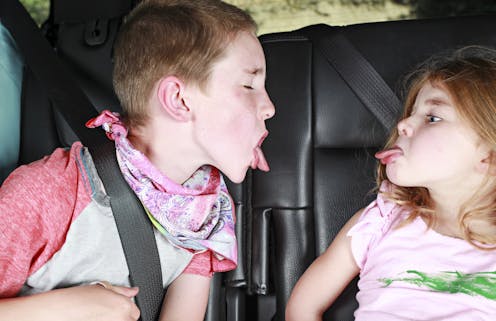How to get the kids through a long car trip without screens or losing your mind
- Written by Mary-Rose McLaren, Professor of Teaching and Learning and Head of Program, Early Childhood Education, Victoria University

Some years ago, my daughter was set a maths problem: how much does it cost to drive a family of four from Melbourne to Sydney, calculating petrol per kilometre and including a night’s accommodation? Her answer was simple: the cost is four airfares – that way the kids won’t kill each other.
Unfortunately, flying is not an option for many people over the holiday period.
So, how do you get the family through that long car trip without all hell breaking loose?
Try and avoid screens
The obvious choice for a long trip is to give the kids a device. But while screens might buy peace in the short term, returning to the real world afterwards can be overwhelming for children.
Lots of passive screen time – such as watching a movie or looking at YouTube – disconnects children from the people around them.
Studies on children up to the age of seven show an association between too much screen time and behaviour problems. Straight after a long time with screens, children can be fractious and argumentative. Parents also know taking the screens away from children can lead to tantrums.
No one wants to start a holiday with a meltdown. So, while there are certainly times and places when screens are useful (and even a blessing) – the long car trip is probably not one of them.
Cars are not natural places to be
Cars are not natural environments for any of us, and especially not for children who discover the world through their senses.
In cars kids can’t move around much, they are cut off from the smells and textures of the world beyond the car. Things outside the window are moving really fast, making processing hard.
This is why some planning and a lot of understanding are important. The key to survival is making space, even in the car, for your child to do what they do best.
Let kids be creative
Children are naturally creative as they look at the world with fresh eyes.
There are lots of ways to harness this creativity in a car. Even with very young children, you can make music together. Make body percussion together (claps, raspberries, tapping and clicking) to create a soundtrack for part of the travel. You can change the rhythm, tempo or sound.
Or you could introduce them to a song you love – and give them a part to sing. Even very young children love serve and return singing – you sing a bit, they sing a bit.
When you need a break, ask the kids to prepare a concert for you using a song they love.
Ask lots of questions
Use the new environments around you as a prompt. Ask your kids questions like, if you were a bird, what would be able to see now? If you were that cow, what would you be thinking?
If you have drawing materials in the car, the children can draw their ideas and make a map of where they are.
If you have two or more children, you could encourage them to make up a play from the perspective of the animals or environment you are driving through. What is happening in that cafe? What is that dog planning for the afternoon?
Oldies but goodies
There are also old-fashioned games like “Spot It”, which is like bingo for the trip.
You can make your own version before you leave on the trip. Create a grid with images of things your child might see – an orange car, a cow, a kangaroo, a tractor, a grape vine.
When they see them, they tick them off. Children can move in and out of this game, especially if you have thought ahead about what they might see on different parts of the journey.
For older kids, make up silly phrases based on number plate letters. For example, QTJ might be “Quick Turtles Jump”. Then you can add several number plates together to make a rhyme or a rap.
Or, get them to add, subtract or multiply several number plate numbers until they get to 100.
Embrace the mess
A small amount of thought before and during the journey can help. But long car trips are hard on kids – which makes them hard on parents.
So embrace the mess and the inevitable moments of grumpiness. Trapped in a car together, this is an opportunity to know your child differently and for them to know you differently. Cars can be great places to discuss tricky topics with children (and teenagers) in non-confronting ways. Try asking some deeper questions, such as: what are the best things in life? What do you wish we did more of as a family? Or, do you think being fair is important?
There are chances here to make happy memories – even if the times in between feel a bit like torture.
Authors: Mary-Rose McLaren, Professor of Teaching and Learning and Head of Program, Early Childhood Education, Victoria University




